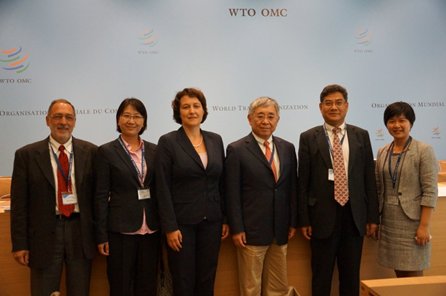The 2014 WTO Public Forum entitled “Why trade matters to everyone” was held in Geneva from 1st to 3rd October, 2014. On day 2, the working session of 'Trade and employment-China’s development process' was jointly organized by the Shanghai WTO Affairs Consultation Centre (SCCWTO) and Shanghai Institute for Free Trade Zone Research, Fudan University.
Prof. Yuan Zhigang, dean of the School of Economics and Shanghai Institute for Free Trade Zone Research at Fudan University, presided at the session. The topic was interpreted by a panel of experts including Marion Jansen, Chief Economist of the International Trade Centre of Switzerland, Peirre Concialdi, researcher of l'Institut de recherches économiques et sociales (IRES), France, Prof. Feng Jin and Dr. Lu Hua from Fudan University.
Dr. Jansen pointed out that in the past decades China's economic growth has been a great success and employment has been appreciably promoted by rising exports. But as the labor market evolves, changes are needed to address the skills and education of future work force and the role of small- and medium-sized businesses in increasing employment. Mr. Concialdi shared the experience of EU and explained European countries’ policies to promote trade and employment at different stages of growth. Prof. Feng looked at China’s foreign trade and women’s employment and analyzed the shocks trade has brought to different industries and workers with different skills. She also made policy suggestions from the aspects of social security, subsidies, and employment services. Dr. Lu examined the different impact trade has on employment in different regions in China due to varying growth levels. She then made policy suggestions on optimizing trade structure, increasing cooperation across different regions, and unifying the labor market.
Prof. YUAN concluded the session by pointing out that the influence of trade on employment is complicated but free trade surely has increased well-being globally and brought about positive changes. China should take the opportunity of deepening globalization to improve its labor market and promote the well-being of individuals in a more open economy.
Translated by Gao Wenxin

